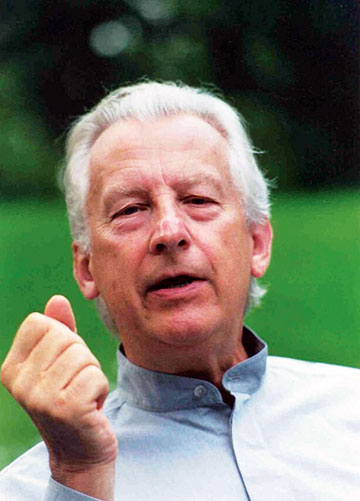Bruckner's Eighth Symphony
by Jan Jezioro

The BPO offers a rare opportunity to hear a monumental masterpiece
In 1954, the late, Austrian-born BPO music director Josef Krips lead the orchestra’s first performance of the mighty Bruckner Symphony No. 8 in C minor, programming it again in 1961. The only other BPO performance of the work occurred in 1991, under the baton of the German guest conductor Hermann Michael. So when guest conductor Günther Herbig takes the podium for the next pair of BPO classic series concerts on Saturday, February 22 at 8pm and Sunday, February 23 at 2:30pm, it may well be the only opportunity for a generation of classical music lovers to enjoy a live performance of the work that Bruckner considered to be his masterpiece.
Herbig, born in 1931, held several important posts in the former East Germany before immigrating to the US in 1984, and has since served as music director of both the Detroit and Toronto Symphony Orchestras, while remaining an active touring guest conductor.
Anton Bruckner came from a family of school teachers in a rural Austrian village and he was slow to finally settle on music as a profession. While he eventually did so, the perpetually unconfident Bruckner found it difficult to give up being a music student, leading the great German conductor Wilhelm Furtwängler to remark, “Schubert and Mozart had already completed their life’s work when Bruckner was still writing counterpoint exercises.” Bruckner became a lifelong church organist, a profession that led him to take the “massive organ sound and move it into the symphony,” according to BPO staff conductor Paul Ferington, as he explained in an informative radio interview with WNED FM classical program host Peter Hall.
Bruckner was 40 before he wrote his first symphony, and as a fervent admirer of the music of Richard Wagner, he found himself and his compositions inadvertently caught up in the intense rivalry that existed between the followers of Brahms and the followers of Wagner in the hotbed that constituted the classical musical world of late-19th-century Vienna. Bruckner finally found critical and popular approval in 1884 at the age of 60 with his Seventh Symphony, leading him to yet again stretch the boundaries of the symphonic form in his next work, the Symphony No. 8. The initial rejection of the work by his most fervent admirer and supporter, the conductor Hermann Levi, helped sink the composer into a deep depression that included thoughts of suicide. Bruckner then began a massive revision of almost all of his earlier symphonies, before even attempting a revision of the Symphony No. 8, an effort that found the composer relying of the assistance of several of his well-meaning but far less talented pupils and associates. The result has been a plethora of editions of almost all the symphonies, as subsequent editors have attempted to rediscover and reconstruct the composer’s original intentions.
This performance will use the 1939 Robert Haas edition, which fell under a shadow after the war, due to the editor’s Nazi affiliations. But, as no less an authority than Michael Steinberg cogently argues in his book The Symphony: A Listener’s Guide, Hass’s remains the most musically successful version.
If the rare opportunity to hear a seldom programmed masterpiece is not enough of an inducement to make your way to Kleinhans Music Hall, the first half of the program will feature a performance of Felix Mendelssohn’s ever popular and frequently performed Violin Concerto in E minor, Op. 64. The soloist will be the exciting young American violinist Benjamin Beilman, the recipient of both a 2012 Avery Fisher Career Grant and a 2012 London Music Masters Award. Beilman was also the winner of the 2010 first prize in the Young Concert Artists International Audition, a distinction that led to his performing a memorable recital program a couple of years ago on a Sunday afternoon in the Mary Seaton Room as part of the Buffalo Chamber Music Society’s irreplaceable free “Gift to the Community” series.
Jazz at the Buffalo Chamber Music Society?
Yes, it’s true. The next program of the Buffalo Chamber Music Society, Tuesday evening series on February 25 at 8pm in the Mary Seaton Room, will feature a performance by the Quator Ebène, a French string quartet that will play their own jazz arrangements in the second half of the program, a new departure for the venerable series, which is currently celebrating its 90th anniversary season. Traditionalists need not fret: The critically acclaimed group will go back to the very well-spring of the genre, opening their concert with Haydn’s Quartet in F minor, Op. 20, No.5. Pairing with the Haydn, Béla Bartók’s Quartet No.4, Sz 91 is a challenging work from the 20th century’s greatest master of medium (apologies to Shostakovich fans) that makes use of extended instrumental techniques.
Tickets are $20, $10 for students.
blog comments powered by Disqus|
Issue Navigation> Issue Index > v13n8 (Week of Thursday, February 20) > Bruckner's Eighth Symphony This Week's Issue • Artvoice Daily • Artvoice TV • Events Calendar • Classifieds |









 Current Issue
Current Issue